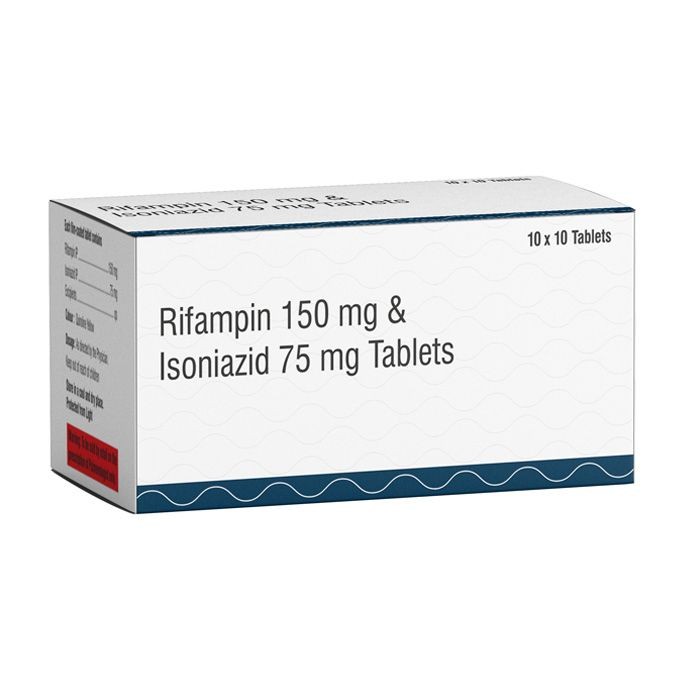
rifampin/isoniazid – oral, Rifamate
WARNING: Isoniazid rarely causes serious liver disease. The risk is higher in people who are 35 years and older, who use alcohol or illegal injection drugs, or who have long-term liver problems. Tell your doctor immediately if you have symptoms of liver disease, including nausea/vomiting, stomach/abdominal pain, weakness/tiredness, dark urine, yellowing eyes/skin. Your doctor should order liver function tests while you are taking this medication. Keep all medical and laboratory appointments.
USES: This product treats tuberculosis (TB). It contains rifampin and isoniazid, both antibiotics that stop the growth of bacteria. This antibiotic only treats bacterial infections and will not work for viral infections (such as the common cold, flu). Using antibiotics unnecessarily or incorrectly can decrease their effectiveness.
HOW TO USE: Take this product by mouth 1 hour before or 2 hours after a meal, usually once daily or as directed by your doctor. If you take antacids, take this medication at least 1 hour before the antacid. Take the medication at the same time each day. Continue taking this medication until the full prescribed amount is finished, even if symptoms disappear. Stopping the medication too early or skipping doses may allow the bacteria to grow, making the infection more difficult to treat. Your doctor may also recommend taking vitamin B6 (pyridoxine) to prevent certain side effects. Follow your doctor’s instructions carefully. This medication may interact with certain foods and cause increased blood pressure, flushing, headache, dizziness, or fast heartbeat. Tell your doctor immediately if any of these symptoms occur. Notify your doctor if your condition worsens.
SIDE EFFECTS: Nausea/vomiting, upset stomach, heartburn, or headache may occur. This medication may cause urine, sweat, saliva, or tears to turn reddish. This is harmless and will disappear when the medication is stopped. However, dentures and contact lenses may become permanently stained. Serious side effects include numbness/tingling of arms/legs, painful/swollen joints, change in urine amount, increased thirst/urination, bloody urine, vision changes, easy bruising/bleeding, signs of a new infection, mental/mood changes, seizures, and severe diarrhea. Seek immediate medical attention if you notice any symptoms of a serious allergic reaction, including rash, itching/swelling, severe dizziness, or trouble breathing. This is not a complete list of side effects. Report any other effects to your doctor or pharmacist. If you are in the US, call your doctor or FDA at 1-800-FDA-1088. In Canada, call your doctor or Health Canada at 1-866-234-2345.
PRECAUTIONS: Before taking this product, tell your doctor or pharmacist if you are allergic to rifampin, isoniazid, or other rifamycins, or if you have any other allergies. Discuss your medical history, especially if you have liver or kidney disease, alcohol use, HIV infection, diabetes, numbness/tingling of arms/legs, recent childbirth, or a certain blood disorder. Before having surgery, tell your doctor or dentist about all the products you use. Avoid alcohol while using this medication. This product may cause live bacterial vaccines to be less effective. During pregnancy, use only when clearly needed. This product passes into breast milk but is unlikely to harm a nursing infant.
DRUG INTERACTIONS: Many drugs can interact with this product. Tell your doctor and pharmacist about all the products you use to prevent serious side effects or changes in medication effectiveness. Do not start, stop, or change the dosage of any other medications without your doctor’s approval. Some drugs that may interact with this medication include acetaminophen, carbamazepine, disulfiram, MAO inhibitors, SSRI antidepressants, and valproic acid. Rifampin can speed up the removal of other medications from your body, affecting how they work. Examples of affected drugs include cyclosporine, digoxin, phenytoin, ranolazine, tacrolimus, theophylline, anti-infectives, azole antifungals, "blood thinners", calcium channel blockers, HIV NNRTIs, and HIV protease inhibitors. This medication may decrease the effectiveness of hormonal birth control pills, patch, or ring. Discuss with your doctor or pharmacist if you should use additional reliable birth control methods while using this medication. This medication may interfere with certain laboratory tests.
OVERDOSE: If overdose is suspected, contact a poison control center or emergency room immediately. Symptoms of overdose may include severe stomach/abdominal pain, unusual tiredness/weakness, yellowing eyes/skin, vision changes, slow/shallow breathing, severe drowsiness.
NOTES: Do not share this medication with others. Periodic lab and medical tests should be performed to monitor your progress or check for side effects. Keep a list of all the products you use and share it with your doctor and pharmacist.
Related Disease Conditions
Tuberculosis (TB)
Tuberculosis (TB) is an infectious disease caused by Mycobacterium tuberculosis. Symptoms include bloody sputum, fever, cough, weight loss, and chest pain. Treatment depends on the type of TB infection.


